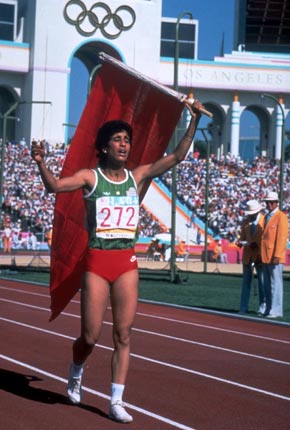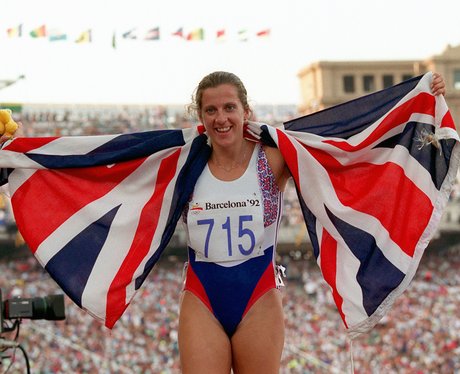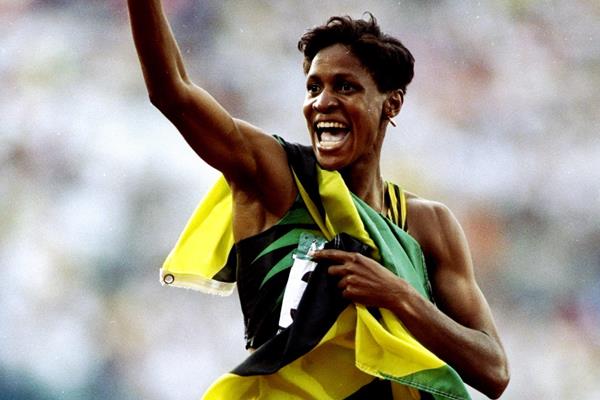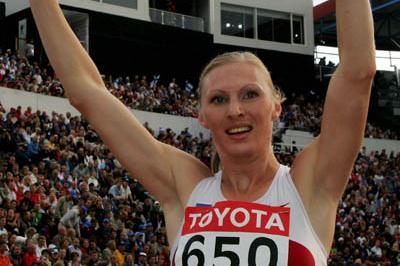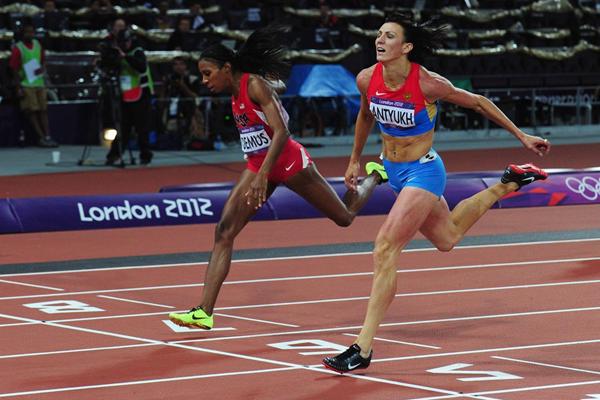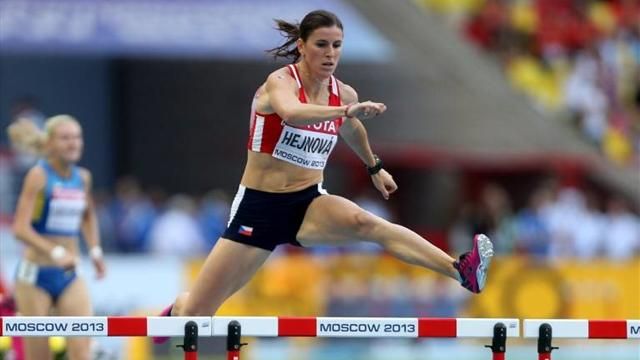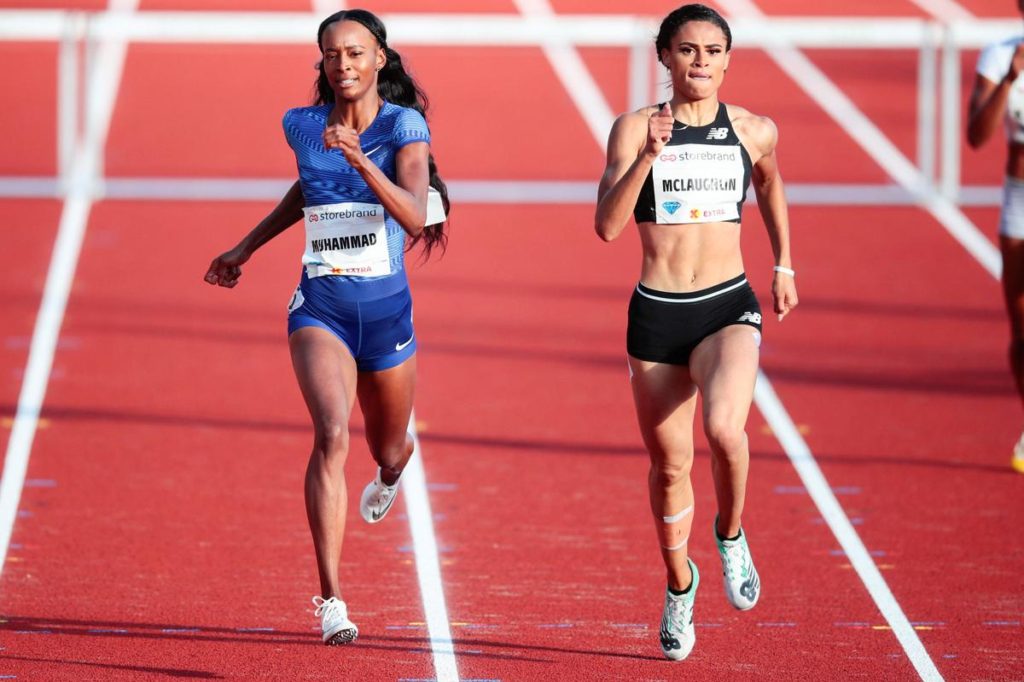History: Women and the Hurdles – 400m
by Savannah Cress
Circa 1860, approximately thirty years after the shorter hurdle races began, the distance was quadrupled, the hurdles spaced further apart, and the 400 meter race was born. The first recognized race for men, located in Oxford, England, was technically 440 meters and consisted of 12 hurdles. Later, in a moment of what can only be described as pure reason, it was decided that 10 hurdles and 400 meters was quite sufficient. By 1900, the 400 meter men’s hurdle race was introduced at the Olympic Games in Paris. With a lag time of 84 years, virtually as unacceptable as that of the shorter races, the women’s 400h was introduced to the Olympics in 1984. Nawal El Moutawakel of Morocco became the first Olympic champion in this event, running as the only woman on the entire Moroccan Olympic team. [am4show not_have=’g5;’]
[/am4show][am4guest]
[/am4guest][am4show have=’g5;’]
[2] [3]
Simultaneous with becoming the inaugural women’s 400h Olympic champion, El Moutawakel became the first female Olympic champion from Africa, as well as the first champion from an Islamic nation. Growing up in Casablanca, she attributes her mentality toward life to her parents, both of whom were very open-minded. Her mother (a big inspiration in her life) played volleyball and then later became a banker–an unusual position for women in the 1950’s. El Moutawakel’s parents, who believed in her immensely, did not project any sort of gender stereotypes on their children, encouraging both their sons and daughters to pursue sports of all kinds. El Moutawakel, now 57, is a strong believer in pushing down barriers in order to find one’s place in this world. Since her early retirement from competing, at just 24 years old, she has made it her mission to help as many young girls as she possibly can, do just that. [3] [9]
After retirement, El Moutawakel began speaking to groups of youth around Casablanca, encouraging them to try sports, pursue their dreams and believe in themselves. Her motivational speaking territory slowly expanded until she was reaching youth and youth sports organizations far beyond her hometown. In 1993, El Moutawakel started “Running for Fun,” a 5km race for women in Casablanca. This race was less about competition and more about introducing the concept of running and racing to women, and nurturing their athletic spirits, which historically had been squelched. This race very quickly became the largest women’s race held in a Muslim country. In 1995, El Moutawakel was elected as a council member of the International Association of Athletics Federations (IAAF). Her influence grew even more in 1998 when she became a member of the International Olympic Committee (IOC), of which she served as Vice President from 2012 until 2016. El Moutawakel continues to passionately pursue being an influential figure in sports, and ensuring doors open and remain open to all, around the world. [9] [10]
Taking second place to El Moutawakel in the 1984 Olympic 400h was Dr. Judi Brown Clarke (known at the time as Judi Brown) from the United States. While American women do not have quite the 400h Olympic record of the American men’s team, which has medaled in every Olympics since 1900, with the exception of years 1968, 1980 and 2004 (including five years of gold, silver, bronze sweeps), USA women’s teams have held one of the top three positions in two-thirds of the games held since 1984. Clarke put American women’s 400 meter hurdling on the map from the very start. [11] [12] [13]
Born in Milwaukee, Clarke’s family later moved to Michigan where she attended Michigan State University and excelled in track and field. By graduation, Clarke had been named a three-time All American and was a five-time national champion before returning as head coach of MSU’s women’s track team in the early 90’s. [14]
In the 1990’s, American women locked down the Olympic silver and bronze medals. In 1992, Sandra Farmer-Patrick and Janeene Vickers held the honors. Sally Gunnell, from Great Britain, claimed the gold.
In addition to the Olympic gold medal in 400h, Gunnell concurrently held the European, British Commonwealth and World Championship titles. In 1993, she won the World Championships in Stuttgart. With this performance, Gunnell set a new world record of 52.74. [5] [15]
At the 1996 Olympics, Americans Kim Batten and Tonja Buford-Bailey won silver and bronze behind Deon Hemmings of Jamaica. The 2-3 finish for Batten and Buford-Bailey came a year after a pivotal race for both athletes, and after a tumultuous health scare for Batten. [12] [7]
Batten had a strong start to 1995, but faced an unexpected medical emergency in May. She underwent surgery to remove an excessively-inflamed appendix. The operation set her back a bit, but the determined young woman took it in stride. Much to the dismay of her doctor, she was back training very soon thereafter. Her efforts were not in vain. Seemingly unstoppable, Batten went on to win the US Nationals and sprint toward the 1995 World Championships. It was here that she and teammate, Buford-Bailey, made history.
By the final stretch of the 400 hurdle race at the Championships, the world watched as Buford-Bailey and Batten pulled away from the competition, matching each other stride for stride, right up to the finish line. Batten finished one hundredth of a second ahead, setting a new 400h world record of 52:61. Both she and Buford-Bailey surpassed the standing world record. [1] [2] [16]
Perhaps even more endearing than her determination, dedication, and strength was the gracious manner with which Batten spoke of that historical moment. She was quick to call attention to the fact that though she won the race on paper, Buford-Bailey was with her, literally, every step of the way. The two women, during that race, worked together, from parallel lanes on the track, to make history. If each had not had the other right there, pushing, pacing, supporting one another, neither of their times would have been in the realm in which they landed. Batten summed up her awareness of their inadvertent cooperation: “I care about her enough as an athlete and as a person that I want for her what I’ve been able to have—to relish in the glory of what she did. It was as tremendous as what I did. One hundredth of a second. You can’t give me credit without giving her credit.” [1] That last sentence sums up a level of humility that is far too infrequently recognized after moments of achievement.
The first decade of the 2000’s is the most diverse as far as countries medaling in the Olympic women’s 400h. Between the three games held, of the nine total medals in that time period, the only country to win more than one of those medals was Jamaica, with Deon Hemmings winning silver in 2000 and Melaine Walker winning gold in 2008. The other seven medals were each won by a different country – specifically Russia, Morocco, Greece, Romania, Ukraine, USA, and Great Britain. [2]
The second decade of the 2000’s has not been so diverse, with the United States claiming half of the six medals in that time frame. Lashinda Demus won silver in the 2012 London games. In Rio, 2016, Dalilah Muhammad took gold and Ashley Spencer bronze. From this race came the first Olympic gold medal ever won by team USA in the women’s 400h. Muhammad achieved this honor, running a 53:13. In July of this year, she set a new world record at the USATF Outdoor Championships in Des Moines, Iowa, breaking the previous world record of 52.34, set in 2003 by Yuliya Pechonkina. Muhammad won the event with a 52.20, claiming her 4th US Outdoor title. [7] [17] [2]
Medaling on either side of Demus in 2012 was Russia’s Natalya Antyukh, with the gold, and a time of 52:70, and Czech Republic’s Zuzana Hejnova with bronze, and 53:38. In August of 2013, Hejnova claimed the 400h World Title while setting a new Czech Republic record of 52:83. She reclaimed this title at the 2015 World Championships in Bejing, with a time of 53:50. [20] [21] [7]
With the games in Tokyo next year, we don’t have to wait too long to see how the third decade will begin for the women’s Olympic 400 hurdles. The events leading up to Tokyo will no doubt be exciting. We watched in June as Sydney McLaughlin pulled out a win at her first professional-level 400h meet, beating an impressive line up, including Muhammad, 2017 World Champion Kori Carter, and 2015 World Championship silver medalist Shamier Little. As McLaughlin transitions from college to pro this season, under coach Joanna Hayes, she has grown tremendously while competing regularly at a professional level. Already, her times have started on a downward slope. By the end of July, at the USA Championships in Iowa, McLaughlin ran a time of 52:88, shaving nearly 1.5 seconds off her June victory. Then by the end of August, she dropped it even lower, running a 52:85 at the Weltklasse meet in Zurich. With these recent times, it’s no surprise that McLaughlin, along with Muhammad, are favorites to medal in the World Championship meet in Doha the end of this month. [18] [19] [23]
At barely 20 years old, and the very start of her professional career, McLaughlin is leading the next generation of women through the 400 hurdles. With the talent and strength of the ladies who paved their way, there are some pretty big spikes to fill. The upside to that 84-year-delay? Many of the OG’s are still around to inspire and guide them through it.
Resources:
[1] http://hurdlesfirstbeta.com/free-articles/profiles/kim-batten-woman-dream/
[2] https://en.wikipedia.org/wiki/400_metres_hurdles
[3] https://www.iaaf.org/disciplines/hurdles/400-metres-hurdles
[4] https://www.iaaf.org/news/report/us-championships-2019-muhammad-world-record-4
[5] https://www.sportsrec.com/7123956/what-is-the-history-of-track-and-field-hurdles
[6] https://en.wikipedia.org/wiki/Women%27s_400_metres_hurdles_world_record_progression
[7] https://www.olympic.org/athletics/400m-hurdles-women
[8] https://www.olympic.org/ms-nawal-el-moutawakel
[9] https://www.golfadvisor.com/articles/podcasts/episode-12-nawal-el-moutawakel
[10] https://en.wikipedia.org/wiki/Nawal_El_Moutawakel
[11] https://www.olympic.org/athletics/400m-hurdles-men
[12] https://www.olympic.org/athletics/400m-hurdles-women
[13] https://en.wikipedia.org/wiki/Judi_Brown_Clarke
[14] https://howardcountymuseum.org/staff/dr-judi-brown-clarke-id-5
[15] https://en.wikipedia.org/wiki/Sally_Gunnell
[16] https://en.wikipedia.org/wiki/Kim_Batten
[17] https://olympics.nbcsports.com/2019/07/28/dalilah-muhammad-400-hurdles-world-record/
[19] https://en.wikipedia.org/wiki/Sydney_McLaughlin
[20] https://en.wikipedia.org/wiki/Zuzana_Hejnov%C3%A1
[21] https://www.european-athletics.org/athletes/group=h/athlete=133246-hejnova-zuzana/index.html
[22] https://www.iaaf.org/athletes/united-states/sydney-mclaughlin-291723
[23] https://www.flotrack.org/articles/6261003-iaaf-releases-2019-world-championships-standards
[/am4show]
